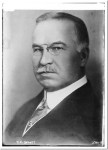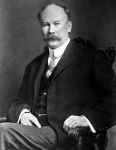
A prior post reviewed the U.S. presidential election of 1900, in which Republicans William McKinley and Theodore Roosevelt were the winning candidates for President and Vice President. Now we focus on Roosevelt’s involvement in that election.
Attending the Republican Party’s National Convention
The involvement began at the Republican Party’s national convention in Philadelphia in June. Although Roosevelt repeatedly had opposed suggestions that he be the Party’s vice presidential nominee, he did attend the convention as a New York delegate-at-large. Once there, he made dramatic arrivals in the city and on the convention floor.
Roosevelt commanded the attention of the entire convention when he seconded the nomination of McKinley. In the words of his biographer, Edmund Morris, Roosevelt “moved confidently through his prepared text, speaking at a torrential speed unusual even for him, his body trembling with the force of his gestures.”[1] He said that the Republican Party in the prior election “did not promise the impossible . . . and kept our word. . . . [the U.S.] has reached a pitch of prosperity never before attained . . . . So it has been in foreign affairs [as well].” He concluded his seconding speech with these words:
- “We stand on the threshold of a new century big with the fate of mighty nations. . . . The young giant of the West stands on a continent and clasps the crest of an ocean on either hand. Our nation, glorious in youth and strength, looks into the future with eager eyes and rejoices as a strong man to run a race. . . . We challenge the proud privilege of doing the work that Providence allots us, and we face the coming years high of heart and resolute of faith that to our people is given the right to win such honor and renown as has never yet been vouchsafed to the nations of mankind.”
On the convention’s vote on his own vice presidential nomination, Roosevelt cast the only negative vote, but immediately afterwards told party officials that he would be a loyal member of the team. He said, “I am as strong as a bull moose, and you can use me to the limit taking heed of but one thing and that is my throat.”[2]
Roosevelt confirmed his acceptance of the nomination in a lengthy letter of September 15th (two and a half months after the convention) that repeated some of the points of his seconding speech at the convention and that attacked the issues promoted by William Jennings Bryan.
Roosevelt’s letter also addressed the “serious problem” presented by “the great business combinations . . . [or] trusts.” This real problem was “immensely aggravated” by “honest but wrong-headed attacks on our whole industrial system in the effort to remove some of . . . [its] evils. . . . No good whatever is subserved by indiscriminate denunciation of corporations generally, and of all forms of industrial combination in particular.” Instead, the “real abuses” need to be attacked first by finding out and publicizing the facts regarding “capitalization, profits and all else of importance.” Those facts would “enable us to tell whether or not certain proposed remedies would be beneficial.”
Campaigning
As indicated in a prior post, Roosevelt conducted a real “whistle-stop” campaign from the rear of a railroad train in 1900. He covered 21,000 miles, giving 673 speeches in 24 states to an estimated three million people. These speeches defended the gold standard and McKinley’s foreign policy. He attacked Bryan for wanting to “paralyze our whole industrial life” and for appealing to “every foul and evil passion of mankind.”


The Almanac of Theodore Roosevelt’s compilation of his “Complete Speeches,” however, only has six campaign speeches, three of which are rebuttals of William Jennings Bryan.[3] The other three bear comment.
“The Labor Question” Speech
Roosevelt on his campaign train from Quincy, Illinois to Chicago in September was accompanied by three railroad executives: my maternal great-great-uncle, William Carlos Brown, then General Manager of the Chicago Burlington & Quincy Railroad; Theodore P. Shonts, then the President of the Illinois & Iowa Railroad (“I&I RR”);[4] and Paul Morton, then the President of the Santa Fe Railroad (“the Santa Fe”).[5]



I have not been able to discover the substance of the conversations the four of them had on the train, but they presumably discussed the issue of federal regulation of business, especially railroads. The three railroaders presumably also were present in Chicago on Labor Day when candidate Roosevelt gave a remarkable speech, even to 21st century ears, on “The Labor Question.”[6]
The general theme of the speech was the importance of “the spirit of brotherhood in American citizenship” that is fostered by association with others not in our “own little set.” Roosevelt emphasized this from his own life in working with “mighty men of their hands” in the Northwest cattle country, with farmers and with “skilled mechanics of a high order.” He added that he had been “thrown into intimate contact with railroad men [and] . . . gradually came to the conclusion that [they] . . . were about the finest citizens there were anywhere around.” Presumably the three railroad executives with him on that trip were included in that group.
Therefore, Roosevelt argued, we “must beware of any attempt to make hatred in any form the basis of action.” He continued, “our chief troubles come from mutual misunderstanding, from failing to appreciate one another’s point of view [and] the great need is fellow feeling, sympathy, brotherhood.”
At the end of the speech, Roosevelt sketched his approach to the issues of the day. He said, “Before us loom industrial problems large in their importance and in their complexity. The last half-century has been one of extraordinary social and industrial development. . . . It is not yet possible to say what shall be the exact limit of influence allowed the State, or what limit shall be set to that right of individual initiative. . . .” Therefore, undertaking efforts to change the State’s involvement in these areas should be with caution and humility. “We can do a great deal when we undertake soberly, to do the possible. When we undertake the impossible, we too often fail to do anything at all.”
The “Free Silver, Trusts and the Philippines” Speech
On September 7th in Grand Rapids, Michigan, Roosevelt castigated Bryan’s “Free Silver” proposal as “the one and only way to insure wide-spread industrial and social ruin.”
Roosevelt also touched on the problems of industrial combinations or trusts that had been raised by Bryan. Roosevelt conceded that “trusts have produced great and serious evils. There is every reason why we should try to abate these evils and to make men of wealth, whether they act individually or collectively, bear their full share of the country’s burdens and keep as scrupulously within the bounds of equity and morality as their neighbors.” However, he added, “wild and frantic denunciation does not do them the least harm and simply postpones the day when we can make them amenable to proper laws.” Repeating his letter of acceptance of the vice presidential nomination, Roosevelt said the first thing was to learn “exactly what each corporation does and earns,” thereby enabling the formulation of “measures for attacking the . . .[ evils] with good prospects of success.”
The “Prosperity, Unity and National Honor” Speech
Roosevelt’s last major speech before the November 6th election was on October 26th at New York City’s old Madison Square Garden.
According to the New York Times, when he arrived at the Garden, “the buzzing sound of many voices became a roar of cheers and the 14,000 people . . . yelled with all their might as they waved small and large American flags. . . . For ten minutes the uproar was deafening. . . . Just as the enthusiasm had reached a climax Gov. Roosevelt spied his wife in [the audience] and bowed and smiled. For the first time his teeth were in plain sight. This little act aroused the people to renewed cheering, drowning the loudest noise which could be produced by two bands of fifty men playing ‘A Hot Time in the Old Town Tonight.’”[7]
Eventually Roosevelt spoke. He lambasted Bryan’s “Free Silver” proposal and his seeking “to sow seeds of malice and envy” in the manner of Robespierre. “No greater evil, oh, my fellow countrymen, can be done this nation of ours than to teach any group of Americans that their attitude should be one of sullen hatred and distrust of their fellows.” Such “bitter class hatreds . . . leads ultimately to class strife, . . . to the loss of liberty . . . [whose] most dangerous enemy [is] anarchy, license, mob violence in any form.”
He concluded by appealing to his fellow countrymen “to keep the conditions under which we have grown so prosperous” and to maintain “the honor of a mighty nation.”
Conclusion
After winning the 1900 election, President McKinley and Vice President Roosevelt were inaugurated on March 4, 1901. In his short inaugural address, Roosevelt said, “For weal or for woe, for good or for evil, . . . [playing “a leading part in shaping the destinies of mankind”] is true of our own mighty nation. Great privileges and great powers are ours, and heavy are the responsibilities that go with these privileges and these powers. . . . We belong to a young nation, already of giant strength, yet whose political strength is but a forecast of power that is yet to come. We stand supreme in a continent, in a hemisphere.”
=========================================
[1] Edmund Morris, The Rise of Theodore Roosevelt at 767-68 (Random House; New York; 1979).
[2] Id. at 768. In 1912 after the Republican Party re-nominated William Howard Taft as its presidential candidate, over Roosevelt’s opposition, Roosevelt organized the Progressive Party (nicknamed the Bull Moose Party) and ran as its presidential candidate. With these two parties splitting the conservative vote, the Democratic presidential candidate, Woodrow Wilson, won the election.
[3] The rebuttals of Bryan were in Detroit on September 7th and Evansville, Indiana on October 12th and in a published letter of October 15th.
[4] Shonts grew up in Centerville, Iowa, and after graduating from Illinois’ Monmouth College, worked in Iowa as a bookkeeper, then an attorney and as an executive of a construction company that built stretches of railroad track. This lead to his becoming an executive for the I&IRR. In 1905 then President Roosevelt appointed Shonts to be the Chairman of the Isthmian [Panama] Canal Commission, a position he held until March 1907, when he became President of the Interborough Rapid Transit Company, which operated New York City’s rapid transit system.
[5] Morton was born in Michigan and grew up in Nebraska as the son of a former U.S. Secretary of Agriculture; his older brother was the founder of Morton Salt. In 1904 President Roosevelt appointed Morton as Secretary of the Navy, but in 1905 he was forced to resign after evidence surfaced that the Santa Fe under his presidency had granted illegal rebates. Morton, however, then became the President of the Equitable Life Assurance Society in New York City.
[6] This account of the Quincy-Chicago trip is based on a January 30, 1907, letter from Brown to Schonts saying “I often think of the trip from Quincy to Chicago, when . . . you and Paul [Morton] and I had the pleasure and the honor of a ride across Illinois with Theodore Roosevelt, then a candidate for Vice-President.” (Image (# 71-0572) provided courtesy of the Library of Congress Prints and Photographs Divisions and Theodore Roosevelt Center at Dickinson State University, www.theodorerooseveltcenter.org.) I plead for anyone who has more information about the Quincy-Chicago trip or the discussions the three railroad executives had with Roosevelt to share such information in a comment to this post.
[7] Gov. Roosevelt Speaks, N.Y. Times (Oct. 27, 1900).